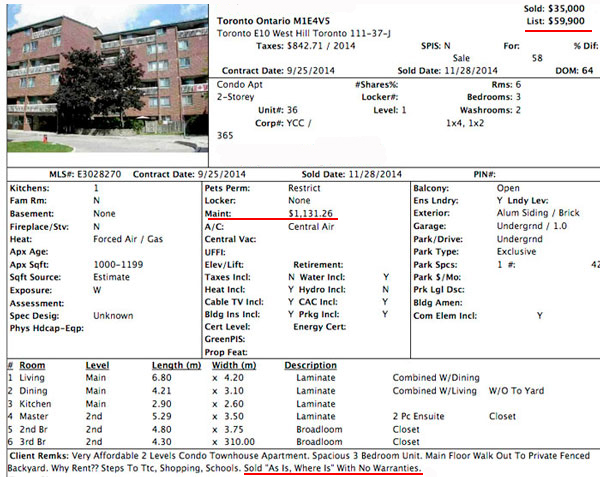| Date |
Selling |
Bed |
Bath |
Fees |
Notes |
| Feb 14 |
$
85,000 |
3 |
2 |
N/A |
sold as-is |
| Feb 14 |
85,000 |
2 |
1 |
$
493.00 |
plus hydro |
| Apr 14 |
129,900 |
3 |
2 |
607.41 |
|
| May 14 |
165,000 |
2 |
1 |
466.72 |
|
| July 14 |
138,000 |
4 |
3 |
858.00 |
$3,000 a
month in
rent |
| July 14 | 149,000 |
4 |
3 |
1,236.46 |
2,240
square feet |
| July 14 | 142,500 |
3 |
2 |
607.41 |
$30,000
spent on
renovations |
| Aug 14 |
110,000 |
3 |
2 |
607.41 |
|
| The administrator dramatically raised the monthly fees |
|||||
| Nov 14 |
$ 35,000 |
3 |
2 |
$ 1,131.26 |
Power
of Sale |
| Jan 15 |
55,000 |
2+1 |
2 |
1,131.26 |
|
| Mar 15 |
55,500 |
3 |
2 |
1,089.99 |
|
| Mar 15 |
45,000 |
3 |
2 |
1,131.26 |
|
| Aug 15 |
43,000 |
2 |
1 |
1,131.62 |
|
| Oct 15 |
85,000 |
2 |
1 |
837.62 |
|
| Oct 15 |
50,000 |
2 |
1 |
837.62 |
|
| Nov 15 |
58,000 |
3 |
2 |
1,089.99 |
|
| Feb 16 |
40,000 |
2 |
1 |
762.03 |
|
| Feb 16 |
48,000 |
2 |
1 |
914.43 |
|
| May 16 |
65,000 |
3 |
2 |
991.74 |
|

